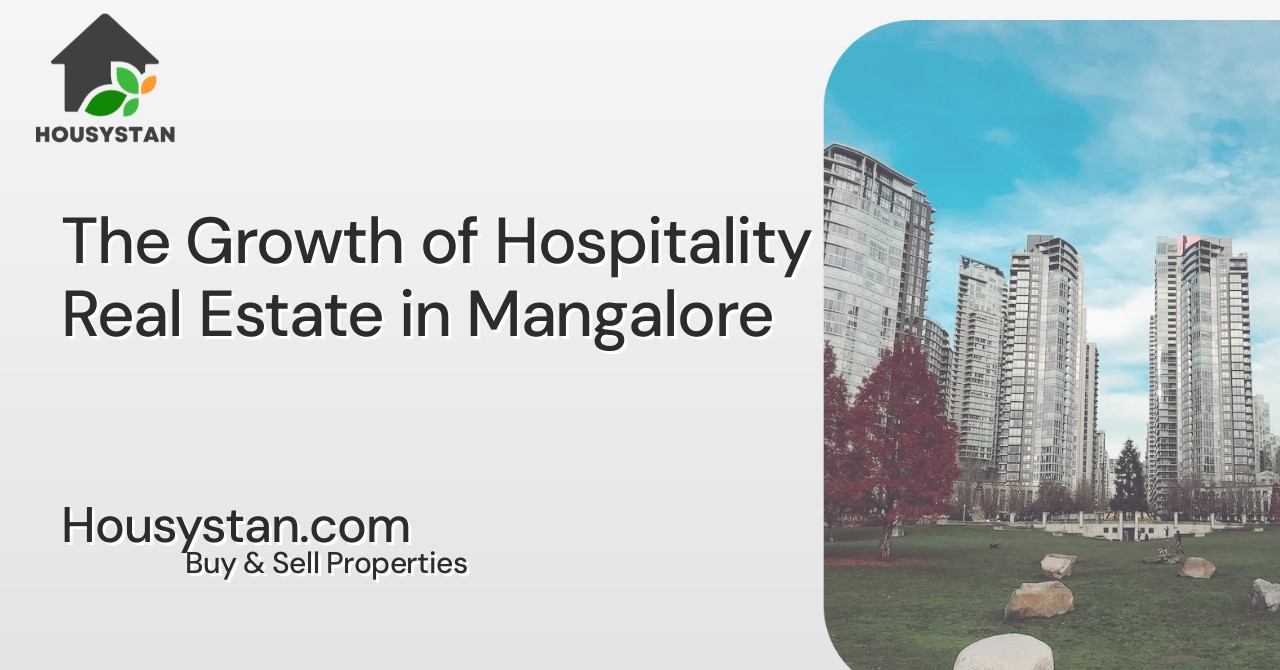The Growth of Hospitality Real Estate in Mangalore
Read latest blogs and articles from Housystan

The Information mentioned here was last updated on:
21/2/2026The Growth of Hospitality Real Estate in Mangalore: A Rising Star on India’s West Coast
Introduction: Mangalore’s Real Estate Renaissance
Once tucked away as a serene coastal city, Mangalore is now making headlines for its rapid transformation, particularly in the hospitality real estate sector. This vibrant port city, nestled between the Arabian Sea and the Western Ghats, is witnessing an unprecedented boom in hotel developments, luxury resorts, and serviced apartments. From global investors eyeing lucrative opportunities to homegrown entrepreneurs launching unique boutique stays, the growth of hospitality real estate in Mangalore reflects a compelling blend of tradition and modernity. What is fueling this surge? Let’s explore the factors, trends, and future prospects shaping this dynamic landscape.
- Verified Tenants/Buyers
- Unlimited Property Listing
- Zero subscription/charges fee
Mangalore’s Strategic Location: Gateway for Tourism and Business
Mangalore’s geographical advantages have played a pivotal role in its real estate ascent. With its well-connected international airport, bustling seaport, and seamless road and rail networks, the city serves as a vital gateway for both leisure and business travelers. Proximity to popular destinations such as Udupi, Coorg, and Goa further boosts tourist footfalls, creating a strong demand for quality accommodations. The city’s impressive educational and healthcare institutions have also contributed to a steady influx of visitors, prompting real estate developers to invest heavily in hospitality infrastructure.
Emergence of Branded Hotels and Boutique Properties
One of the most noticeable trends in Mangalore’s hospitality real estate market is the proliferation of branded hotels. International chains like Marriott, Radisson, and Taj have established their presence, catering to a growing class of discerning travelers. Simultaneously, innovative boutique hotels and homestays are popping up, offering personalized experiences that resonate with millennials and Gen Z tourists. This diversification is not only elevating the city’s profile but also setting new standards for hospitality in the region.
Economic Drivers: IT Boom and Port-Based Commerce
The economic landscape of Mangalore has undergone significant change in recent years. The city’s robust IT sector, spearheaded by tech parks and start-ups, is attracting professionals from across the country. Additionally, Mangalore’s status as a major commercial port has amplified business travel, leading to a surge in demand for upscale hotels and serviced residences. These economic drivers are directly influencing real estate investment decisions, with developers focusing on projects that blend business amenities with leisure offerings.
Tourism Trends: Nature, Heritage, and Culinary Delights
Mangalore’s allure extends far beyond its business credentials. The city is a treasure trove of natural beauty, with pristine beaches like Panambur and Tannirbhavi drawing sun-seekers and adventure enthusiasts alike. Heritage landmarks such as St. Aloysius Chapel and Sultan Battery offer glimpses into the region’s storied past. The city’s unique cuisine, featuring dishes like neer dosa and ghee roast, is gaining popularity with food travelers. These tourism trends are prompting investors to develop properties that highlight local culture and sustainability, creating immersive experiences for guests.
Infrastructure Developments: Catalysts for Growth
Infrastructure upgrades have been instrumental in Mangalore’s real estate boom. From airport expansion projects to the modernization of highways and the new Mangalore Port, enhanced connectivity is making the city more accessible than ever. The government’s Smart City initiatives are further enhancing urban amenities, improving water supply, waste management, and public transportation. These developments are significantly boosting investor confidence and accelerating hospitality real estate growth in and around the city.
Residential Market Meets Hospitality: The Rise of Serviced Apartments
A noteworthy trend in Mangalore’s hospitality real estate scene is the blending of residential and hospitality segments. Serviced apartments and co-living spaces are gaining traction among business travelers, medical tourists, and long-stay guests. These properties offer the comfort of home with the convenience of hotel services, filling an important gap in the accommodation spectrum. Real estate developers are responding by launching projects that cater to both short-term and extended-stay markets, further diversifying the city’s hospitality offerings.
Challenges and Opportunities: Navigating Regulatory and Environmental Hurdles
While the growth trajectory is impressive, the sector faces challenges such as regulatory complexities and environmental concerns. Stringent zoning laws, heritage conservation regulations, and the need to balance development with sustainability require careful navigation. However, these challenges also present opportunities for innovative solutions. Eco-friendly construction practices, energy-efficient designs, and responsible tourism initiatives are increasingly being embraced by developers, aligning growth with long-term ecological balance.
Investment Hotspots: Where the Action Is
Several localities in Mangalore are emerging as investment magnets for hospitality real estate. Areas such as Kodialbail, Kadri, and Surathkal are witnessing a flurry of activity, with new hotels, resorts, and serviced apartments breaking ground. Proximity to the central business district, educational institutions, and the coastline is driving demand in these neighborhoods. Real estate experts predict steady appreciation in property values, making Mangalore an attractive proposition for both domestic and international investors.
Future Outlook: Sustainable Growth and Global Aspirations
The future of hospitality real estate in Mangalore looks promising. As the city continues to attract tourists, professionals, and entrepreneurs, demand for diverse accommodation options is set to rise. Industry experts foresee a shift towards green buildings, smart technologies, and experiential tourism, with Mangalore positioning itself as a model for balanced urban growth. The city’s ability to harmonize its rich heritage with contemporary aspirations will be key to sustaining its momentum in the hospitality real estate sector.
Conclusion: Mangalore’s Moment in the Sun
Mangalore’s journey from a quiet coastal town to a bustling hospitality hub is a testament to its adaptability and vision. With strategic investments, robust infrastructure, and a unique cultural landscape, the city is poised to play a pivotal role in India’s hospitality real estate story. For investors, developers, and travelers alike, Mangalore offers a blend of opportunity, charm, and growth potential that is hard to match elsewhere on the west coast. As the sun sets over its golden beaches, the future of hospitality real estate in Mangalore shines brighter than ever.